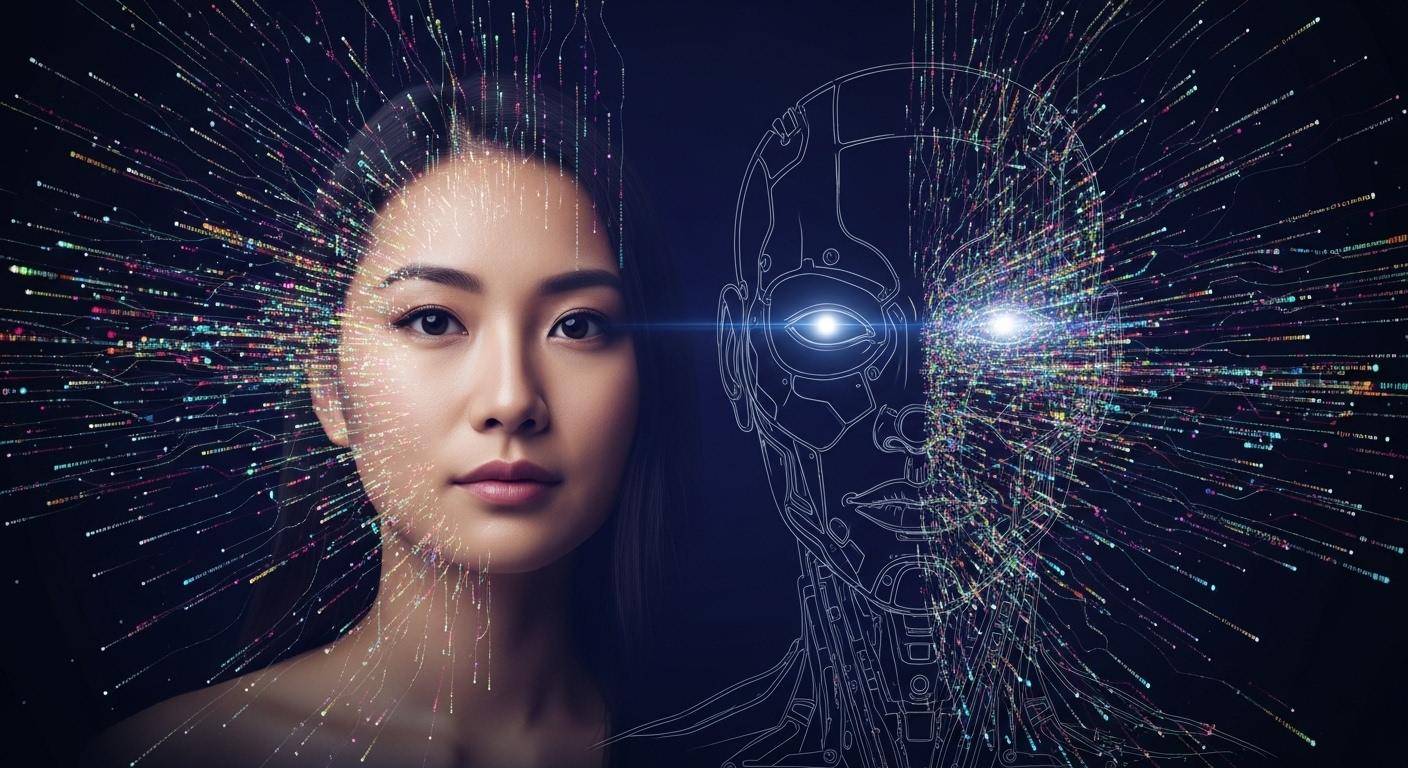We stand at a pivotal moment where artificial intelligence can produce responses that seem profoundly insightful. Yet, this advancement prompts a crucial question: Is insight equivalent to understanding? Or is AI merely mirroring the intelligence we've programmed into it?
The Nature of Meaning and Intelligence
What becomes of meaning when intelligence is no longer exclusively human? We teach AI to identify patterns, process language, and even create art. But does this equate to true understanding?
-
AI's Rapid Advancement: From composing music to writing narratives, AI demonstrates remarkable capabilities. However, beneath its impressive outputs lies the question: Is AI truly understanding, or just predicting?
The Illusion of Understanding: Beyond Prediction
AI's responses are not born from personal experience or introspection. Instead, they are predictions based on statistical likelihood derived from data patterns. This section explores the mechanics of AI's "understanding," illustrating how these abilities are rooted in predictive algorithms rather than genuine comprehension. We'll highlight examples where AI's outputs appear insightful but are actually sophisticated mimicry.
-
AI does not 'know' like humans—it calculates.
-
AI does not 'experience' meaning—it mimics structure.
-
AI does not 'learn' contextually—it processes probabilities.
Is Meaning Something That Can Be Computed? The Data-Consciousness Gap
Humans don't merely recognise words; we infuse them with experiences, emotions, and memories. Meaning transcends linguistic structure, linking language with consciousness. This section delves into the qualitative differences between human meaning-making and AI's data processing. It addresses whether meaning can be reduced to computations while considering empathy, intuition, and subjective experience—elements central to human understanding.
-
AI can detect sentiment, but does it feel?
-
AI can generate meaning, but does it grasp significance?
-
AI can replicate thought patterns, but does it think?
The Threshold Question: What Defines Understanding?
Understanding transcends finding the correct answer; it encompasses why something matters. It involves nuance, contradiction, and context. This section proposes a holistic understanding definition, stressing lived experiences, emotional intelligence, and ambiguity navigation as vital components. We examine how AI falls short in these areas.
-
If AI cannot experience the world, can it ever truly understand it?
-
If intelligence is just pattern recognition, is that enough to call it ‘thinking’?
-
And if AI convincingly mimics meaning, does the distinction even matter?
Redefining Intelligence in a New Era
We are at a threshold where AI can generate responses that feel deeply insightful. As we advance, we must ask: Is insight the same as understanding? Or is AI merely reflecting the intelligence we've embedded within it? This concluding section reflects on the implications of AI's growing capabilities for our understanding of intelligence itself. It invites readers to contemplate the ethical and philosophical questions arising when intelligence no longer exclusively belongs to humans and what this means for the future of human-AI collaboration and coexistence.
If meaning is a human experience, what happens when intelligence no longer belongs only to us?
This question invites us to explore the profound implications of sharing our cognitive realm with machines. As AI continues to evolve, it challenges our traditional notions of intelligence and prompts us to reconsider the essence of what it means to understand and create meaning.
When intelligence extends beyond humans, it raises questions about identity, agency, and the nature of consciousness. If AI can replicate tasks traditionally associated with human intelligence, such as creating art or interpreting language, does it dilute the uniqueness of human experience? Or does it expand the boundaries of what we consider possible, offering new pathways for collaboration and innovation?
Moreover, this shift urges us to reflect on the ethical dimensions of AI integration into our lives. As AI systems become more autonomous, the lines between human-driven and machine-driven decision-making blur. We must ensure that the development of AI aligns with values that prioritise human dignity and the common good, fostering an environment where technology enhances rather than diminishes our humanity.
Ultimately, the question of meaning in a world where intelligence is shared with AI is not just about the capabilities of machines, but about how we choose to define and understand our own humanity in the face of transformative technological change. It invites a dialogue about coexistence, responsibility, and the future we wish to build together.
Final Reflections
In considering the intersection of human and artificial intelligence, we find ourselves compelled to probe deeper into the essence of understanding. As AI systems become increasingly adept at mimicking human thought, we face a pivotal moment: will these systems merely function as mirrors of our own intelligence, or will they evolve into entities capable of genuine comprehension? This juncture beckons us to ponder the implications of AI's rapid advancement on our perception of intelligence itself.
As we navigate this uncharted territory, it's crucial to reflect on the broader questions that emerge: What does it mean for humanity if intelligence is no longer our exclusive domain? How do we redefine our understanding of creativity and meaning in a world where machines can replicate these once uniquely human traits? These inquiries not only challenge our philosophical and ethical frameworks but also demand that we carefully consider our values and the future we envision in a landscape shared with AI.
I invite you to delve into these questions and engage in a dialogue about the evolving role of intelligence and meaning. It is a conversation that will shape not just the future of technology, but the essence of what it means to be human in an era of unprecedented change.

Learn More |

